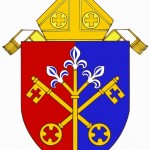Bill Nye The Science Guy and Ken Ham, Creation Man, will face off in a debate this evening that’s garnered a lot of attention on the Internet and in local communities.
Tickets for the debate in the 800-seat auditorium at the Creation Museum in Kentucky sold out within twenty minutes after they went on sale yesterday. The debate will air at 7:00 p.m. Eastern Time on NBCNews.com and MSNBC.com, or via debatelive.org. And some folks I know are gathering at local churches to watch on a big screen as the guru of science dukes it out with the guru of creationism.
Their theme? Creation vs. Evolution. Or Religion vs. Science. Or, more exactly, the question which each will try to answer:
“Is Creation A Viable Model of Origins in Today’s Modern Scientific Era?”
But here’s the thing: There’s another way.
See, Bill Nye, a militant atheist, believes that science holds the explanation for everything, and that the Big Bang or something-or-other caused the earth to appear here and evolution caused primitive animals to emerge from the primordial soup and stand erect and gradually turn into humans. Nye would deny the existence of a Creator God, relegating all of the mysteries and complexities of the universe to chance, implausible chance.
And Ken Ham, founder of the young-earth apologetics organization Answers In Genesis, takes a fundamentalist view of Scripture which believes the earth was created in just six days and is actually only several thousand years old. He insists on the literal interpretation of Scripture, denying the possibility that a “day” actually refers to a period or an era–even though we often use the word that way in our modern “day” conversation.
The debate tonight, as it’s constructed, ignores the possibility—even the likelihood—of another, more reasoned position: that a Creator (Whom we call God) created the world and infused it with meaning, that we are more than happenstance, that there is a purpose to our lives, but that He need not have done so in a rigid six-day format. The theory of Intelligent Design fits nicely here (although it is not the only possible answer).
EVOLUTION IN THE NEWS IN GREAT BRITAIN
Tonight’s debate is actually not the only pop media event to consider theories of creation this month.
In the UK, the reality show “Faith Swap” featured Bentley Browning, a comedian and committed Christian, who switched religious practices for a month with Simon Capes, an atheist comedian. During that month, Christian Bentley Browning stopped his practice of daily prayer, church attendance and other faith rituals. Capes, who had avoided religious practice altogether, committed to attending church and devoting time to prayer.
The two have recently completed their quest, and have begun to speak about the experience. Was either converted? No—but they do seem to have achieved their goal of greater understanding.
Browning tweeted about how difficult it was for him to stay away from the God upon Whom he relies:
And,
Capes, for his part, wrote of his experience,
“I’ve been exploring Christianity now for nearly a month. I’ve met some lovely people and witnessed some very supportive communities, I’ve even had some of my preconceptions and predjudices blown away. But, and yes there is a but, I haven’t found Jesus or God, yet.”
Perhaps he will.
What is the Catholic Church’s teaching with regard to creation and evolution?
Well, first, the Church does not have an official position on how the universe was created. Did the stars, nebulae, and planets come into being in the aftermath of the Big Bang? If, as modern cosmologists explain, this was the way the world was created, then the Church holds that this must be attributed to God and His plan. The Scriptures read:
By the word of the Lord the heavens were made, and all their host [stars, nebulae, planets] by the breath of his mouth” (Ps. 33:6).
What about various life forms? Did animals develop over time, from lower, unicellular creatures and invertebrates, to more complicated life forms? If they did evolve, then they did so under the impetus and guidance of God, and their ultimate creation must be ascribed to Him.
But what about man? Regarding human evolution, the Church has a more definite teaching: It is permissible to believe that man’s body developed from more primitive life forms, under the direction of God. However, the Church avers the special creation of the soul.
Pope Pius XII declared that
“…the teaching authority of the Church does not forbid that, in conformity with the present state of human sciences and sacred theology, research and discussions . . . take place with regard to the doctrine of evolution, in as far as it inquires into the origin of the human body as coming from pre-existent and living matter—[but] the Catholic faith obliges us to hold that souls are immediately created by God” (Pius XII, Humani Generis 36).
So whether the human body developed gradually as a result of evolution, or whether it was specially created, we are required to hold as a matter of Catholic faith that the human soul is specially created; it did not evolve, and it is not inherited from our parents, as our bodies are.
And while the Church allows a wide range of belief regarding evolution and special creation, it specifically denies atheistic evolution, such as the theory promulgated by Bill Nye.
What about time? How long did God take to create the universe?
The Catholic Church has infallibly determined that the universe is of finite age–that it has not existed from all eternity. However, it has not infallibly defined whether the world was created only a few thousand years ago, or whether it was created several billion years ago. This is a matter on which Catholics are free to disagree.
The events told in Genesis 1 are, the Church teaches, real occurences, not mere legend. However, they may be told in a style of historical writing that Westerners do not typically use, and may not conform to the six-day schedule espoused by Ken Ham.
And, the Church insists, Adam and Eve were real people. The story of the creation of Adam and Eve and their fall from grace in Genesis 2-3 is a matter of faith. Some scientists have speculated that there was actually a pool of early human couples (a teaching known as ‘polygenism’), rather than original pair of two human beings (a teaching known as ‘monogenism’). Pope Pius XII clarified the Church’s stance on that, stating:
“When, however, there is a question of another conjectural opinion, namely polygenism, the children of the Church by no means enjoy such liberty. For the faithful cannot embrace that opinion which maintains either that after Adam there existed on this earth true men who did not take their origin through natural generation from him as from the first parents of all, or that Adam represents a certain number of first parents. Now, it is in no way apparent how such an opinion can be reconciled that which the sources of revealed truth and the documents of the teaching authority of the Church proposed with regard to original sin which proceeds from a sin actually committed by an individual Adam in which through generation is passed onto all and is in everyone as his own” (Humani Generis 37).
The story of the creation and fall of man is a true one, even if not written in a style familiar to modern readers. The Catechism of the Catholic Church states,
“The account of the fall in Genesis 3 uses figurative language, but affirms a primeval event, a deed that took place at the beginning of the history of man. Revelation gives us the certainty of faith that the whole of human history is marked by the original fault freely committed by our first parents” (CCC 390).
Pope Leo XIII, writing in Providentissimus Deus 18, explained that despite the rejection of faith that is common to Bill Nye and the New Atheists, there is no real disagreement between the theologian and the scientist, provided each keeps within his own limits. Rather, Pope Leo explained,
“…If nevertheless there is a disagreement…it should be remembered that the sacred writers, or more truly ‘the Spirit of God who spoke through them, did not wish to teach men such truths (as the inner structure of visible objects) which do not help anyone to salvation’; and that, for this reason, rather than trying to provide a scientific exposition of nature, they sometimes describe and treat these matters either in a somewhat figurative language or as the common manner of speech those times required, and indeed still requires nowadays in everyday life, even amongst most learned people”.
The Catechism of the Catholic Church (CCC 159) explains more fully:
“Methodical research in all branches of knowledge, provided it is carried out in a truly scientific manner and does not override moral laws, can never conflict with the faith, because the things of the world and the things of the faith derive from the same God. The humble and persevering investigator of the secrets of nature is being led, as it were, by the hand of God in spite of himself, for it is God, the conserver of all things, who made them what they are”.
So the Catholic Church is not afraid of science or scientific discovery. All knowledge will, in the end, reveal more about the wisdom and the majesty of God.













